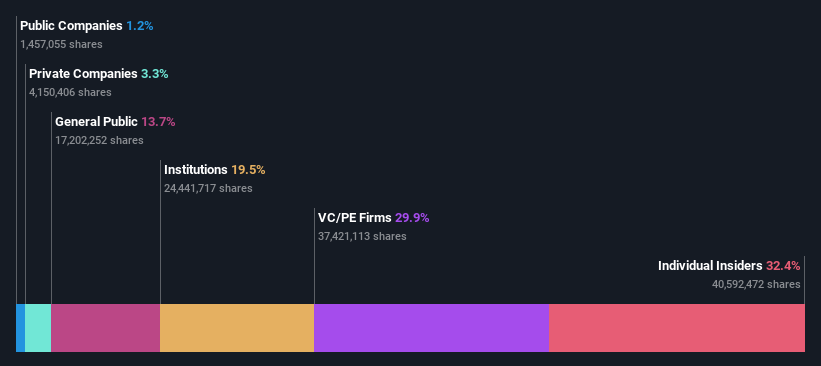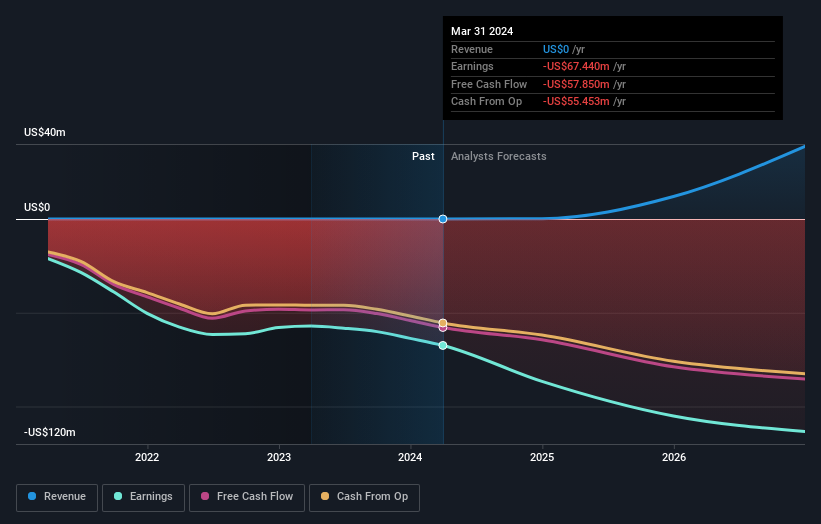With 32% ownership, Nautilus Biotechnology, Inc. (NASDAQ:NAUT) insiders have a lot riding on the company's future
Key Insights
Nautilus Biotechnology's significant insider ownership suggests inherent interests in company's expansion
A total of 4 investors have a majority stake in the company with 54% ownership
A look at the shareholders of Nautilus Biotechnology, Inc. (NASDAQ:NAUT) can tell us which group is most powerful. We can see that individual insiders own the lion's share in the company with 32% ownership. Put another way, the group faces the maximum upside potential (or downside risk).
So it follows, every decision made by insiders of Nautilus Biotechnology regarding the company's future would be crucial to them.
Let's take a closer look to see what the different types of shareholders can tell us about Nautilus Biotechnology.
Check out our latest analysis for Nautilus Biotechnology
What Does The Institutional Ownership Tell Us About Nautilus Biotechnology?
Institutional investors commonly compare their own returns to the returns of a commonly followed index. So they generally do consider buying larger companies that are included in the relevant benchmark index.
We can see that Nautilus Biotechnology does have institutional investors; and they hold a good portion of the company's stock. This implies the analysts working for those institutions have looked at the stock and they like it. But just like anyone else, they could be wrong. It is not uncommon to see a big share price drop if two large institutional investors try to sell out of a stock at the same time. So it is worth checking the past earnings trajectory of Nautilus Biotechnology, (below). Of course, keep in mind that there are other factors to consider, too.
Hedge funds don't have many shares in Nautilus Biotechnology. From our data, we infer that the largest shareholder is Parag Mallick (who also holds the title of Top Key Executive) with 17% of shares outstanding. Its usually considered a good sign when insiders own a significant number of shares in the company, and in this case, we're glad to see a company insider play the role of a key stakeholder. Andreessen Horowitz LLC is the second largest shareholder owning 14% of common stock, and Sujal Patel holds about 14% of the company stock. Interestingly, the third-largest shareholder, Sujal Patel is also a Member of the Board of Directors, again, indicating strong insider ownership amongst the company's top shareholders.
To make our study more interesting, we found that the top 4 shareholders control more than half of the company which implies that this group has considerable sway over the company's decision-making.
While it makes sense to study institutional ownership data for a company, it also makes sense to study analyst sentiments to know which way the wind is blowing. There are plenty of analysts covering the stock, so it might be worth seeing what they are forecasting, too.
Insider Ownership Of Nautilus Biotechnology
While the precise definition of an insider can be subjective, almost everyone considers board members to be insiders. Management ultimately answers to the board. However, it is not uncommon for managers to be executive board members, especially if they are a founder or the CEO.
Insider ownership is positive when it signals leadership are thinking like the true owners of the company. However, high insider ownership can also give immense power to a small group within the company. This can be negative in some circumstances.
Our information suggests that insiders maintain a significant holding in Nautilus Biotechnology, Inc.. It has a market capitalization of just US$293m, and insiders have US$95m worth of shares in their own names. We would say this shows alignment with shareholders, but it is worth noting that the company is still quite small; some insiders may have founded the business. You can click here to see if those insiders have been buying or selling.
General Public Ownership
With a 14% ownership, the general public, mostly comprising of individual investors, have some degree of sway over Nautilus Biotechnology. While this size of ownership may not be enough to sway a policy decision in their favour, they can still make a collective impact on company policies.
Private Equity Ownership
Private equity firms hold a 30% stake in Nautilus Biotechnology. This suggests they can be influential in key policy decisions. Sometimes we see private equity stick around for the long term, but generally speaking they have a shorter investment horizon and -- as the name suggests -- don't invest in public companies much. After some time they may look to sell and redeploy capital elsewhere.
Private Company Ownership
We can see that Private Companies own 3.3%, of the shares on issue. Private companies may be related parties. Sometimes insiders have an interest in a public company through a holding in a private company, rather than in their own capacity as an individual. While it's hard to draw any broad stroke conclusions, it is worth noting as an area for further research.
Next Steps:
I find it very interesting to look at who exactly owns a company. But to truly gain insight, we need to consider other information, too. To that end, you should learn about the 3 warning signs we've spotted with Nautilus Biotechnology (including 2 which are significant) .
If you are like me, you may want to think about whether this company will grow or shrink. Luckily, you can check this free report showing analyst forecasts for its future.
NB: Figures in this article are calculated using data from the last twelve months, which refer to the 12-month period ending on the last date of the month the financial statement is dated. This may not be consistent with full year annual report figures.
Have feedback on this article? Concerned about the content? Get in touch with us directly. Alternatively, email editorial-team (at) simplywallst.com.
This article by Simply Wall St is general in nature. We provide commentary based on historical data and analyst forecasts only using an unbiased methodology and our articles are not intended to be financial advice. It does not constitute a recommendation to buy or sell any stock, and does not take account of your objectives, or your financial situation. We aim to bring you long-term focused analysis driven by fundamental data. Note that our analysis may not factor in the latest price-sensitive company announcements or qualitative material. Simply Wall St has no position in any stocks mentioned.
Have feedback on this article? Concerned about the content? Get in touch with us directly. Alternatively, email editorial-team@simplywallst.com

 Yahoo Finance
Yahoo Finance 

